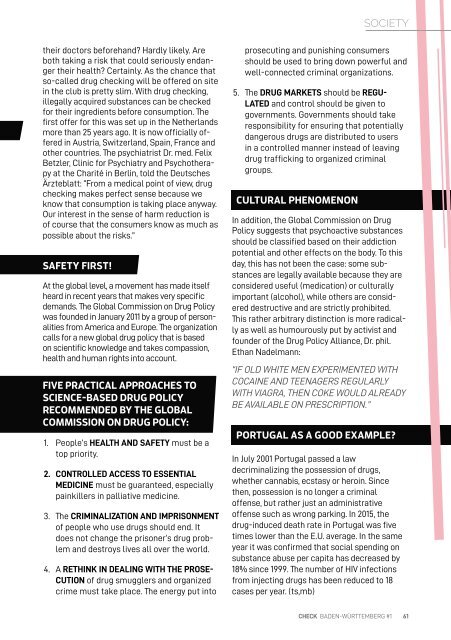CHECK Ba-Wü #1
- Keine Tags gefunden...
Erfolgreiche ePaper selbst erstellen
Machen Sie aus Ihren PDF Publikationen ein blätterbares Flipbook mit unserer einzigartigen Google optimierten e-Paper Software.
SOCIETY<br />
their doctors beforehand? Hardly likely. Are<br />
both taking a risk that could seriously endanger<br />
their health? Certainly. As the chance that<br />
so-called drug checking will be offered on site<br />
in the club is pretty slim. With drug checking,<br />
illegally acquired substances can be checked<br />
for their ingredients before consumption. The<br />
first offer for this was set up in the Netherlands<br />
more than 25 years ago. It is now officially offered<br />
in Austria, Switzerland, Spain, France and<br />
other countries. The psychiatrist Dr. med. Felix<br />
Betzler, Clinic for Psychiatry and Psychotherapy<br />
at the Charité in Berlin, told the Deutsches<br />
Ärzteblatt: “From a medical point of view, drug<br />
checking makes perfect sense because we<br />
know that consumption is taking place anyway.<br />
Our interest in the sense of harm reduction is<br />
of course that the consumers know as much as<br />
possible about the risks.”<br />
SAFETY FIRST!<br />
At the global level, a movement has made itself<br />
heard in recent years that makes very specific<br />
demands. The Global Commission on Drug Policy<br />
was founded in January 2011 by a group of personalities<br />
from America and Europe. The organization<br />
calls for a new global drug policy that is based<br />
on scientific knowledge and takes compassion,<br />
health and human rights into account.<br />
FIVE PRACTICAL APPROACHES TO<br />
SCIENCE-BASED DRUG POLICY<br />
RECOMMENDED BY THE GLOBAL<br />
COMMISSION ON DRUG POLICY:<br />
1. People‘s HEALTH AND SAFETY must be a<br />
top priority.<br />
2. CONTROLLED ACCESS TO ESSENTIAL<br />
MEDICINE must be guaranteed, especially<br />
painkillers in palliative medicine.<br />
3. The CRIMINALIZATION AND IMPRISONMENT<br />
of people who use drugs should end. It<br />
does not change the prisoner‘s drug problem<br />
and destroys lives all over the world.<br />
4. A RETHINK IN DEALING WITH THE PROSE-<br />
CUTION of drug smugglers and organized<br />
crime must take place. The energy put into<br />
prosecuting and punishing consumers<br />
should be used to bring down powerful and<br />
well-connected criminal organizations.<br />
5. The DRUG MARKETS should be REGU-<br />
LATED and control should be given to<br />
governments. Governments should take<br />
responsibility for ensuring that potentially<br />
dangerous drugs are distributed to users<br />
in a controlled manner instead of leaving<br />
drug trafficking to organized criminal<br />
groups.<br />
CULTURAL PHENOMENON<br />
In addition, the Global Commission on Drug<br />
Policy suggests that psychoactive substances<br />
should be classified based on their addiction<br />
potential and other effects on the body. To this<br />
day, this has not been the case: some substances<br />
are legally available because they are<br />
considered useful (medication) or culturally<br />
important (alcohol), while others are considered<br />
destructive and are strictly prohibited.<br />
This rather arbitrary distinction is more radically<br />
as well as humourously put by activist and<br />
founder of the Drug Policy Alliance, Dr. phil.<br />
Ethan Nadelmann:<br />
“IF OLD WHITE MEN EXPERIMENTED WITH<br />
COCAINE AND TEENAGERS REGULARLY<br />
WITH VIAGRA, THEN COKE WOULD ALREADY<br />
BE AVAILABLE ON PRESCRIPTION.”<br />
PORTUGAL AS A GOOD EXAMPLE?<br />
In July 2001 Portugal passed a law<br />
decriminalizing the possession of drugs,<br />
whether cannabis, ecstasy or heroin. Since<br />
then, possession is no longer a criminal<br />
offense, but rather just an administrative<br />
offense such as wrong parking. In 2015, the<br />
drug-induced death rate in Portugal was five<br />
times lower than the E.U. average. In the same<br />
year it was confirmed that social spending on<br />
substance abuse per capita has decreased by<br />
18% since 1999. The number of HIV infections<br />
from injecting drugs has been reduced to 18<br />
cases per year. (ts,mb)<br />
<strong>CHECK</strong> BADEN-WÜRTTEMBERG <strong>#1</strong><br />
61


















